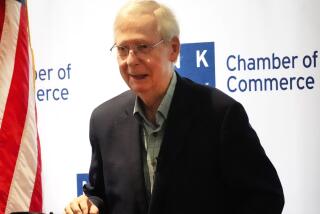Yeltsin Feeling Better, Officials Say : Russia: President recovering after heart trouble. But health problems raise questions about his political future.
- Share via
MOSCOW — With a flurry of medical updates unprecedented for the Kremlin, Russian President Boris N. Yeltsin was described Wednesday as up and walking, signing documents, making phone calls and getting over the heart trouble that hospitalized him a day earlier.
“Yeltsin’s condition is good, he is recovering quickly,” Sergei A. Filatov, the presidential chief of staff, announced. “Under the doctors’ plan, he will be discharged from the hospital Monday and return to a normal work schedule.”
The 64-year-old leader’s symptoms of cardiac ischemia--a constriction of blood flow to the heart--caused tremors of insecurity in Moscow’s political Establishment and financial markets, but no crisis. Stock prices rebounded from Tuesday’s 10% dip, and Parliament busied itself Wednesday with the 1996 budget and laws on taxes and oil drilling.
Kremlin-watchers and ordinary Russians explained the subdued reaction to Yeltsin’s life-threatening ailment as a result of the frequent, reassuring medical reports and a measure of faith in the largely untested constitutional system the president has created.
But those remarkable changes from the secrecy and intrigue of the past did little to improve Yeltsin’s troubled political prognosis.
For the first time since Yeltsin took office four years ago, the country has a clear leadership alternative to him in the person of his prime minister, Viktor S. Chernomyrdin, who has been gaining in stature as the president’s popularity plummets.
Under the 1993 constitution, the prime minister would assume power as acting president in the event of Yeltsin’s “sustained inability due to health to discharge his powers.” He would then have to call presidential elections within three months.
Many Russians who voted for Yeltsin as the bold champion of democracy and market reform now view him as an impediment. Some people interviewed in central Moscow said the president’s sick heart might actually be healthy for the country, by finishing his career early or dissuading him from seeking a second five-year term in June.
“He is no longer a man who can give the country a fresh impulse and instill hope,” said Yuri V. Yarin, 40, a Russian linguistics and literature professor. “He is no longer the only guarantor of stability and reform. There are other competent forces. The time has come to tell him goodby.”
Political succession was always uncertain and often bloody in the 1,000-year history of czarist and Communist Russia; leaders rarely if ever gave up power voluntarily. In an autobiography published last year, Russia’s first democratically elected president vowed to become the first to leave office in a “normal, civilized and orderly” way.
Yeltsin’s ratings have deteriorated along with his health, his physical appearance and public behavior over the past four years--especially since he launched an unpopular war against the breakaway republic of Chechnya. On Wednesday, Communists in Parliament tried to impeach him but fell short of putting the question on the agenda.
A poll published last week said 2.6% of Russian urban residents would vote for Yeltsin if elections were held now. In another survey, opinion leaders said Chernomyrdin had eclipsed the president as Russia’s most influential figure since negotiating a peaceful end to a bloody attack by hostage-taking Chechen rebels last month.
Although some analysts are wary of dismissing Yeltsin’s reelection chances, his wife, Naina, has joined many supporters in urging him not to run. Political aides of the 57-year-old Chernomyrdin spoke eagerly in private Wednesday of their boss’s improved presidential hopes.
But an inner circle of Kremlin hard-liners--men like Defense Minister Pavel S. Grachev and Maj. Gen. Alexander V. Korzhakov, the president’s security chief--are urging Yeltsin to run again, most likely because their careers depend on it. Some of them called publicly last spring for postponing the elections, raising concern that they might try to resist any new leader.
Some politicians speculated that Yeltsin told aides to publicize his ailment in dramatic fashion to see who lined up for and against his reelection. Chernomyrdin, continuing to deny any presidential ambitions, downplayed the illness and said Yeltsin is fully in charge.
“The president, just like any other person, has a right to feel unwell,” he told reporters after a 20-minute phone conversation with Yeltsin. “Everything is all right.”
Yeltsin’s office said the president was rushed Tuesday to the Central Clinical Hospital, a Moscow facility built to treat top Soviet officials, after experiencing chest pains.
Presidential spokesman Sergei Medvedev gave almost hourly accounts Tuesday of Yeltsin’s progress. On Wednesday he said the president spent a “quiet night” in the hospital and woke up “in a mood to work.” He said Yeltsin’s blood pressure was stable, that his electrocardiogram was normal and that the chest pains had not returned.
“We don’t have anything to hide,” Medvedev told the Associated Press.
Still, the information was limited. Little was disclosed about the circumstances of the attack. All reports came from the Kremlin, not from doctors, and there were no pictures of the supposedly active president.
Russians welcomed the openness anyway, and journalists Wednesday felt emboldened to ask Chernomyrdin about reports that he underwent secret heart surgery a few years ago; he angrily denied them.
More to Read
Sign up for Essential California
The most important California stories and recommendations in your inbox every morning.
You may occasionally receive promotional content from the Los Angeles Times.













